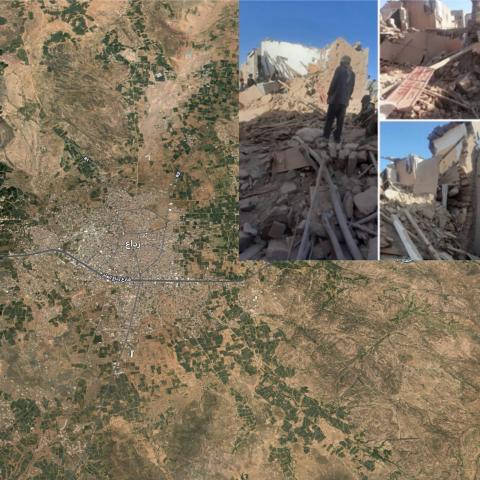
Alkarama condemns the bombing of a number of civilian homes by gunmen from the Houthi group, which calls itself "Ansar Allah", on Tuesday morning, March 19, 2024, killing and wounding at least 25 civilians, including women and children, and calls for an end to using this method as part of the tools of war.
Years ago, the Rada’a area, located 150 km southeast of Sana'a, was the scene of attacks by US drones. Alkarama was able to document many of these attacks and conducted direct interviews with some of the surviving victims and their families. The house bombing incident recalled the policies of "Targeted Killing" which has claimed the lives of hundreds of innocent people without, to date, justice, accountability or redress.
According to sources who spoke to Alkarama, the Houthi group sent a military group consisting of armored vehicles and dozens of gunmen against the backdrop of the killing of one of its members accused of killing a local tribesman. The group blew up two houses with explosive devices in the Al Hofr neighbourhood of Rada'a, destroying six adjacent houses which collapsed on their inhabitants.
Despite the Houthis' acknowledgment of being behind the incident and pledging to investigate it under the pressure of broad public opinion condemning the incident, the Houthis, which has become a de facto authority in the capital Sana'a and a number of Yemeni governorates, follow a systematic policy of blowing up the homes of its political opponents. The American Center for Justice documented the total destruction of 713 homes, with the governorate of Al Bayda' topping the list with 118 homes. These figures contradict Houthi claims that the incident was an individual act.
Background
According to information received from Rada'a, the shelling of civilian homes led to the demolition of two houses belonging to the Ibrahim Al-Zailai family, the house of Muhammad Al-Yarimi, the house of Alawi Al-Mujahar, the house of Al-Naqous, the house of Ahmed Al-Khalbi, the house of Saleh Hadi and the house of Al-Faqih, resulting in the deaths of at least 12 civilians, 9 of whom belonged to the family of Muhammad Saad Al-Yarimi.
Muhammad Saad Al-Yarimi died, along with his wife and all his children, when their house collapsed following the shelling of two neighbouring houses, while the other four were killed by an RPG shell. The Houthis also fired on a group that was trying to intervene to help the victims.
The names of those killed are as follows:
2. Sayeda Alyarimi, mother (50)
3. Saad Mohammed Saad Al-Yarimi (32)
4. Ali Mohammed Saad Al-Yarimi (22)
5. Jabali Mohammed Saad Al-Yarimi (18)
6. Ramzi Mohammed Saad Al-Yarimi (20)
7. Mabrouka Mohammed Saad Al-Yarimi (19)
8. Karima Ahmed Al-Aqari (25), wife of Ibrahim Muhammad Saad Al-Yarimi, who was injured in the incident.
9. Akram Ibrahim Mohammed Saad Al-Yarimi (15)
In addition, four Muhamasheen people were killed and others, including children, were injured by a shell fired by a Houthi drone against medics before it landed on the Muhamasheen’s home in the nearby Old Market neighborhood whose data could not be obtained due to the blackout measures imposed by the Houthi authorities.
Although Houthi gunmen prevented the rescue of the victims, the residents insisted on working to recover 7 victims from under the rubble of the destroyed houses: Ahmed Al-Khalbi (60) and his wife Aisha Al-Khalbi (55), in addition to their son Ali Ahmed Al-Khalbi, who was reportedly kidnapped by the Houthis while he was injured as a result of the collapse of the house.
The citizens also recovered Khairia Farea (30) and her three children who were injured: Ibrahim Saad Muhammad Saad Al-Yarimi (2), Lutfia Saad Muhammad Saad Al-Yarimi (5) and Muhammad Saad Muhammad Saad Al-Yarimi (9).
Despite the Houthi group's attempt to prevent citizens from documenting the effects of the bombing, the videos showed a state of anger among the people, who later came out in peaceful gatherings condemning the incident. The Houthi authorities cracked down on the demonstrators and fired live ammunition to disperse them.
Human rights sources said that the Houthi authorities in Al Bayda and Sana'a are exerting intense pressure, amounting to death threats, against activists and human rights defenders who broadcast photos and clips of this incident, which sparked wide reverberations in the Yemeni street.
The Houthi group scrambled to try to contain popular anger by visiting surviving victims to the hospital and pledging to rebuild their homes.
Rada'a and the right to life
The Yemeni Rada'a region suffered from a series deadly attacks and human rights violations since they were invaded by Saleh and Houthi forces in 2015. Before, this area suffered from deadly attacks by US drones, some of which were documented by Alkarama.
For example, on September 2, 2012, a US missile attack on a car carrying civilians killed 12 people, including two children and a woman, while another died after months of suffering from his wounds.
Alkarama conducted investigation into the attack and interviewed some victims’ families’ and survivors and addressed to the United Nations Special Rapporteurs on the promotion and protection of human rights and fundamental freedoms while countering terrorism and on extrajudicial killings.
On 2 December 2013, a US drone targeted a wedding procession composed of 14 Vehicle, and fired 4 rockets killing 12 people and injuring 13.
Alkarama's representatives were able to go there and visit the site of the attack in Aqaba Zaaj in the Ould Rabie district, one of the Rada'a districts, and met survivors of the bombing and the relatives of some of the victims
